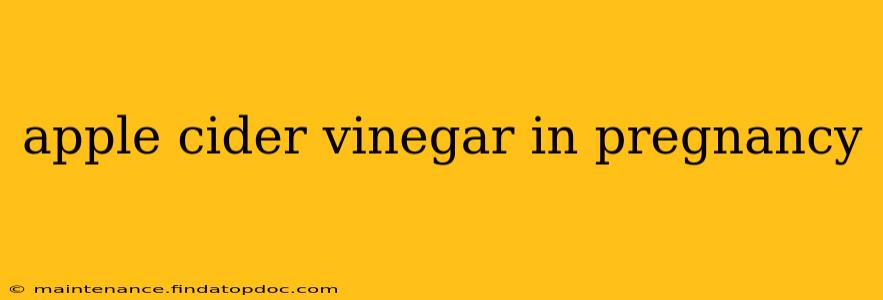Apple cider vinegar (ACV) has gained popularity for its purported health benefits, leading many to wonder about its use during pregnancy. While some believe it offers advantages, it's crucial to understand both the potential benefits and risks associated with consuming ACV during this delicate period. This comprehensive guide will explore the topic, answering common questions and providing evidence-based information.
What are the purported benefits of apple cider vinegar during pregnancy?
Many believe ACV can help with various pregnancy-related discomforts. These include:
-
Heartburn/Acid Reflux: ACV's acidity is sometimes touted as a way to neutralize stomach acid, although the scientific evidence supporting this claim is limited and inconclusive during pregnancy. The effect may vary significantly between individuals.
-
Blood Sugar Regulation: Some studies suggest that ACV may improve insulin sensitivity. However, more research is needed, especially in pregnant women, before any definitive claims can be made. Self-medicating with ACV for gestational diabetes is strongly discouraged. Always consult your doctor for managing blood sugar levels during pregnancy.
-
Weight Management: While ACV might play a role in weight management in some individuals, its effectiveness during pregnancy is unknown and potentially risky. Weight gain during pregnancy is necessary for fetal development.
Is it safe to consume apple cider vinegar during pregnancy?
This is the most critical question. The short answer is: it's best to err on the side of caution. While small amounts of diluted ACV might not cause harm, there is insufficient research to confirm its safety during pregnancy. Potential risks include:
-
Tooth Enamel Erosion: ACV's acidity can erode tooth enamel over time. This risk is heightened during pregnancy due to hormonal changes that can make teeth more susceptible to damage.
-
Interactions with Medications: ACV might interact with certain medications you're taking during pregnancy. This is particularly crucial to consider if you're on medication for diabetes, blood pressure, or other conditions.
-
Electrolyte Imbalance: Consuming large amounts of ACV can disrupt electrolyte balance, potentially causing adverse effects. Electrolyte balance is critical during pregnancy for both the mother and the developing fetus.
-
Low Potassium Levels: High doses of apple cider vinegar can lower potassium levels, which is vital for various bodily functions including heart health, particularly concerning during pregnancy.
-
Potential for Miscarriage or Preterm Labor: While not directly proven, some anecdotal evidence links high ACV consumption to these complications. More research is required to determine a causal link.
How should I use apple cider vinegar during pregnancy (if at all)?
If you are considering using ACV during pregnancy for any reason, it is absolutely crucial to consult your doctor or a qualified healthcare professional first. They can assess your individual circumstances and determine if it's safe for you. If approved, they will likely recommend a very diluted form and in small quantities. Never use undiluted ACV.
What are the side effects of apple cider vinegar during pregnancy?
Potential side effects include nausea, heartburn (ironically), vomiting, and stomach upset. Severe complications are less common but include electrolyte imbalances and tooth enamel erosion.
Does apple cider vinegar help with morning sickness?
There's no conclusive evidence to support the claim that ACV alleviates morning sickness. In fact, its acidity might worsen nausea and vomiting in some pregnant women. Always consult your doctor for safe and effective remedies for morning sickness.
Can I use apple cider vinegar topically during pregnancy?
Topical use, such as in diluted form for skin conditions, is generally considered safer than oral consumption. However, it's still advisable to consult your doctor before applying ACV topically, especially on large areas of skin. Always perform a patch test first to check for any allergic reactions.
Conclusion:
While apple cider vinegar has some purported benefits, its use during pregnancy remains a grey area due to limited research. The potential risks, particularly concerning tooth enamel, electrolyte balance, and medication interactions, outweigh any unproven benefits. Prioritizing the health and safety of both mother and baby is paramount. Always consult your doctor or midwife before using apple cider vinegar or any other supplement during pregnancy. They can provide tailored advice based on your individual health needs and circumstances. Remember, your health provider's guidance is crucial throughout your pregnancy.
